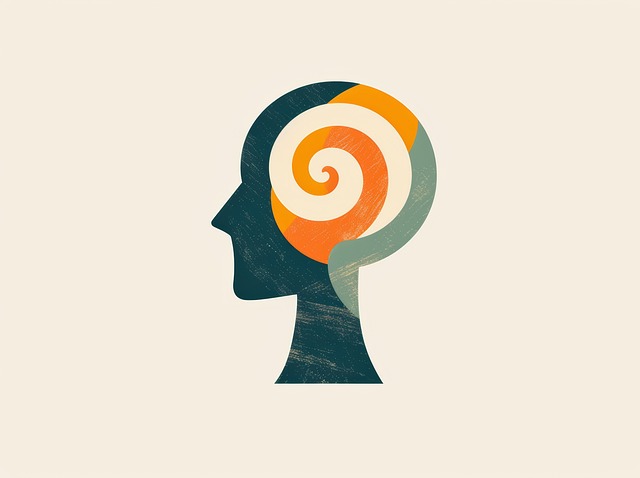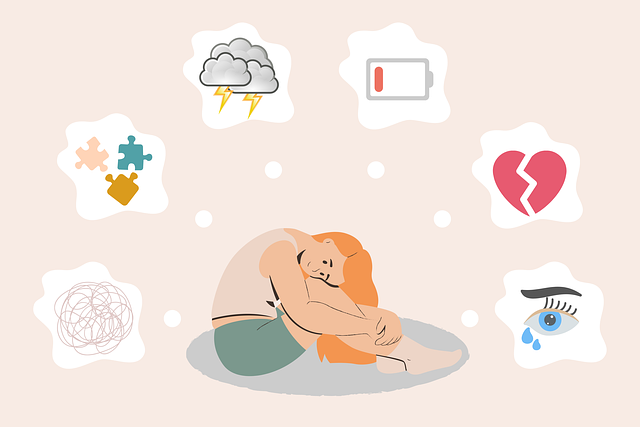Denver Blended Families Therapy offers a comprehensive approach to managing anxiety within complex family structures, addressing genetic predispositions, trauma, and step-parent dynamics. Using Cognitive Behavioral Therapy (CBT), mindfulness techniques, and stress management workshops, therapists help individuals improve self-esteem, develop conflict resolution skills, and process emotions. The program prioritizes burnout prevention through structured routines, balanced lifestyles, and culturally competent care, fostering a healthier, more harmonious family environment.
Anxiety is a prevalent condition affecting individuals across various life stages. Understanding its symptoms and causes is the first step towards effective management. This article explores holistic approaches to tackling anxiety, including Denver Blended Families Therapy, which offers tailored support for complex family dynamics. We also delve into evidence-based methods like Cognitive Behavioral Therapy (CBT) and discuss mindfulness techniques and lifestyle adjustments that can significantly improve mental well-being.
- Understanding Anxiety: Symptoms and Causes
- Denver Blended Families Therapy: A Holistic Approach
- Cognitive Behavioral Therapy (CBT): Shaping Thought Patterns
- Mindfulness and Relaxation Techniques for Calmness
- Lifestyle Adjustments for Better Mental Well-being
Understanding Anxiety: Symptoms and Causes

Anxiety is a natural response to stressful situations, but when it becomes overwhelming and persistent, it can significantly impact daily life. Understanding anxiety involves recognizing its various symptoms, which can range from physical sensations like increased heart rate and difficulty breathing to emotional states such as worry, fear, or restlessness. These symptoms often manifest in different ways, affecting individuals’ thinking, behavior, and interactions with others.
The causes of anxiety are multifaceted, including genetic predisposition, traumatic life events, chronic stress, and certain medical conditions. For blended families in Denver, managing anxiety can be particularly complex due to the unique dynamic between step-parents and children, as well as the potential for past traumas or adjustment issues. Social Skills Training and Mental Wellness Podcast Series Production can offer valuable resources for coping strategies, while Stress Management techniques tailored to these situations can greatly enhance overall mental wellness.
Denver Blended Families Therapy: A Holistic Approach

Denver Blended Families Therapy offers a holistic approach to managing anxiety, recognizing that each family is unique. This method aims to address the complex dynamics within blended families, where step-parents, biological parents, and children from different backgrounds may experience varying levels of stress and anxiety. By providing a safe and supportive environment, therapists facilitate open communication, helping individuals process their emotions and understand their role in the family system.
The therapy focuses on self-esteem improvement and stress management workshops tailored to the specific needs of blended families. Through these sessions, family members learn coping strategies, conflict resolution techniques, and effective communication skills. Additionally, risk assessment for mental health professionals is conducted to ensure a thorough understanding of potential challenges and to provide targeted interventions, fostering a healthier, more harmonious family environment.
Cognitive Behavioral Therapy (CBT): Shaping Thought Patterns

Cognitive Behavioral Therapy (CBT) is a powerful tool in managing anxiety by targeting and reshaping negative thought patterns. This therapy helps individuals identify distorted thinking and replace it with more realistic, balanced perspectives. By understanding how thoughts influence emotions and behaviors, CBT empowers Denver blended families to navigate life’s challenges with greater resilience. Therapists work collaboratively with clients to challenge unhelpful beliefs and develop coping strategies tailored to their unique needs.
This approach not only aids in anxiety relief but also fosters inner strength development and self-care routine establishment for better mental health. Trauma support services, often integrated into CBT, can be instrumental in addressing underlying causes of anxiety, especially in blended family settings where complex emotional dynamics may exist. Through CBT, individuals gain valuable insights, learn effective coping mechanisms, and build the skills needed to manage anxiety over the long term.
Mindfulness and Relaxation Techniques for Calmness

Mindfulness and relaxation techniques are powerful tools for managing anxiety and cultivating calmness, especially within Denver blended families therapy contexts. By focusing on the present moment and accepting one’s feelings without judgment, individuals can reduce the impact of anxious thoughts. Practicing mindfulness involves paying attention to bodily sensations, breathing patterns, and environmental cues, allowing for a deeper connection with the here and now. This simple yet profound shift in awareness can help break the cycle of worry and stress that often characterizes anxiety disorders.
Relaxation techniques complement mindfulness by offering specific strategies to calm the mind and body. Deep breathing exercises, progressive muscle relaxation, and guided imagery are effective methods to lower heart rates, reduce tension, and promote a sense of tranquility. Incorporating these practices into daily routines can help prevent burnout and enhance overall well-being, particularly for those navigating complex family dynamics through Mental Health Policy Analysis and Advocacy or coping with the challenges of Burnout Prevention. Moreover, Developing strong Coping Skills enables individuals to effectively navigate stressful situations and maintain emotional balance.
Lifestyle Adjustments for Better Mental Well-being

Maintaining mental wellness is a holistic process that requires attention to all aspects of life. For Denver blended families therapy, lifestyle adjustments can significantly impact anxiety management and overall well-being. Creating structured routines, prioritizing quality sleep, and engaging in regular physical activity are essential practices. A balanced diet, often overlooked but powerful, can enhance mood and energy levels, reducing the intensity of anxious feelings.
In today’s fast-paced world, burnout prevention is crucial for everyone, especially those navigating complex family dynamics. Involving the entire family in discussions about mental health encourages open communication and fosters an environment where everyone feels heard and supported. Cultural competency training for healthcare providers plays a vital role here, ensuring that therapy sessions are inclusive and tailored to meet the unique needs of blended families, ultimately promoting healthier relationships and stronger mental resilience.
In managing anxiety, a multi-faceted approach is key. By understanding the symptoms and causes, seeking professional help like Denver Blended Families Therapy for holistic care, and employing techniques such as CBT for thought pattern reshaping, mindfulness for calmness, and lifestyle adjustments for mental well-being, individuals can effectively navigate and overcome anxiety. These strategies empower individuals to live more balanced lives, fostering resilience and promoting overall emotional health.











